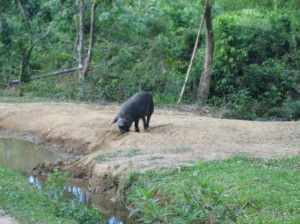Alelu’k and Alebu’tud
Alelu’k and Alebu’tud lived together in their own house. They had no neighbors. One day Alelu’k said to his wife, “I must go and hunt some pigs.”
Then he started out to hunt, taking with him his three dogs. He did not find any wild pigs; but before long he sighted a big deer with many-branched antlers. The dogs gave chase and seized the deer, and held it until the man came up and killed it with the sharp iron spike that tipped his long staff. Then the man tied to the deer’s antlers a strong piece of rattan, and dragged it home.

photo from http://arellevalla.com/photos/?a=el-nido-palawan-philippines&i=984
When he reached his house, his wife met him joyfully; and they were both very happy, because they had now plenty of meat. They brought wood and kindled a fire, and fixed over the fire a frame of wood tied to upright posts stuck into the ground. On the frame they laid the body of the deer to singe off the hair over the flames. And when the hair was all burned off, and the skin clean, Alelu’k began to cut off pieces of venison, and Alebu’tud got ready the big clay pot, and poured into it water to boil the meat.
But there was only a little water in the house, so Alubu’tud took her bucket, and hurried down to the river. When she reached there, she stood with her bare feet in the stream, and dipped the bucket into the stream, and took it out full of water. But, just as she turned to climb up the river-bank, an enormous fish jumped out of the river, seized her, dragged her down, and devoured her.
At home, Alelu’k was watching for his wife to come back bringing the water. Day after day he waited for her, and all day long he was crying from sorrow.
The man (Alelu’k) symbolizes a big black ant that makes its nest in a hollow tree. The woman (Alebu’tud) is a little worm that lives in the palma brava tree. The fish is another man who carried off Alelu’k’s wife.
Notes on the story
“Alelu’k” and “Alebu’tud” are Ata names, for which the Bagobo forms are respectively Bungen and Batol.
The long handle or rod of a spear, tipped with a sharp-pointed iron cone; equally useful for killing animals, and, driven into the ground, for supporting the spear when at rest. The same name (tidalan) is applied to the shaft of a spear lacking the blade, and carried by old people like a mountain-staff.
A vessel formed of a single internode of bamboo, in which water is brought from the river, and kept in the house.


